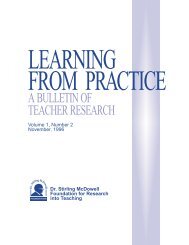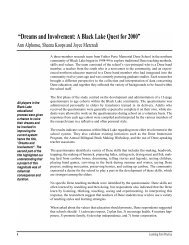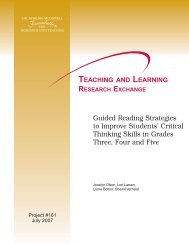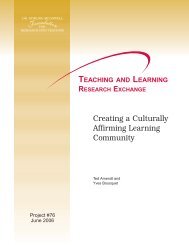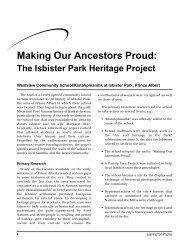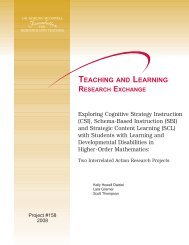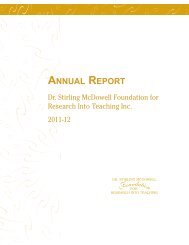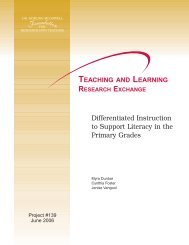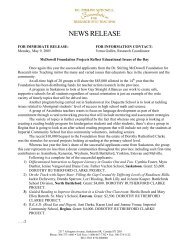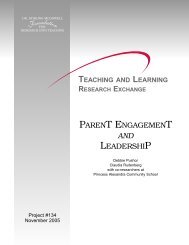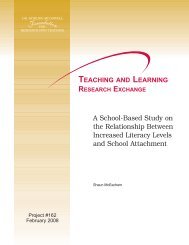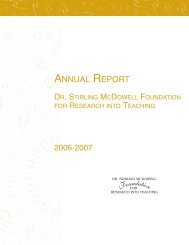Involving Community Members to Develop Culturally Relevant Word ...
Involving Community Members to Develop Culturally Relevant Word ...
Involving Community Members to Develop Culturally Relevant Word ...
Create successful ePaper yourself
Turn your PDF publications into a flip-book with our unique Google optimized e-Paper software.
GrAde twO/three:<br />
• Children about seven or eight used <strong>to</strong> listen <strong>to</strong> legends and oral s<strong>to</strong>ries. Children learned<br />
through s<strong>to</strong>ries and legends; they knew <strong>to</strong> sit still and <strong>to</strong> listen while legends were being<br />
<strong>to</strong>ld <strong>to</strong> them. Through legends, children learn how certain places got their names and<br />
how other objects got their Cree names. Other ways that children were taught were by<br />
telling them about everyday things, and eventually they were taught about religion and<br />
how the world was made and other living things. As they got a little older, I <strong>to</strong>ld my<br />
children not <strong>to</strong> be disrespectable and <strong>to</strong> have respect for others.<br />
• I encouraged my children <strong>to</strong> address their relatives by kinship term, not by their first<br />
name. Some examples include: nohkom (my grandmother), nitōsis (my aunt), and nistīs<br />
(my older brother). Through these terms, children learn words and concepts about<br />
relations and about respect.<br />
• I taught my own children not <strong>to</strong> hate other people, not <strong>to</strong> spread rumours or <strong>to</strong> talk<br />
unflatteringly about other people. This should be talked about <strong>to</strong> students at schools,<br />
how words can destroy people. Children need <strong>to</strong> be taught appropriate behaviour and<br />
how <strong>to</strong> get along with others.<br />
• Children should be encouraged <strong>to</strong> visit Elders; they will learn from them and it is okay<br />
<strong>to</strong> tell children repeatedly about the same lesson.<br />
GrAde FOur:<br />
• When a child is immersed in a language from preschool age <strong>to</strong> 11 years old, they should<br />
develop practical conversational skills.<br />
• The children will acquire language that is used at home, in the community, and at school.<br />
They learn from observing and conversing with relatives, friends, community members,<br />
and teachers at school.<br />
• The students can begin <strong>to</strong> read s<strong>to</strong>ry books written in the language.<br />
• Songs are very important teaching methodologies; sing songs with students.<br />
• mistahi kita-kī-kiskinwahamowāwak kwayask kita-nīhithowīcik. Children can be taught<br />
a lot on how <strong>to</strong> speak Cree.<br />
Copyright Gift of Language and Culture Project, 2009<br />
12 RESEARCH REPORT: <strong>Involving</strong> <strong>Community</strong> <strong>Members</strong> <strong>to</strong> <strong>Develop</strong> <strong>Culturally</strong> <strong>Relevant</strong> <strong>Word</strong> Lists for First Nations and Métis Students



